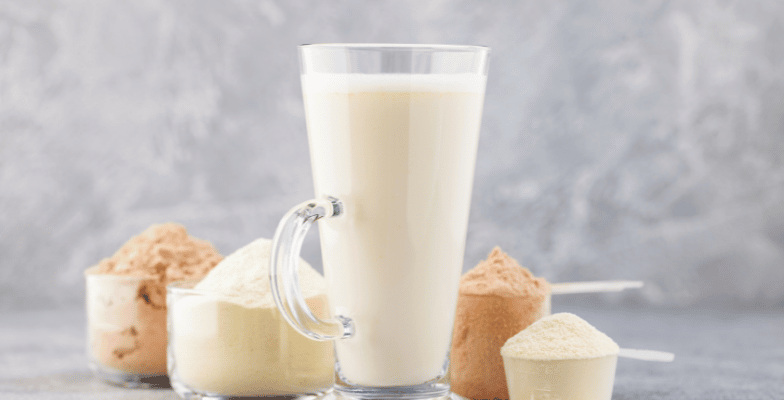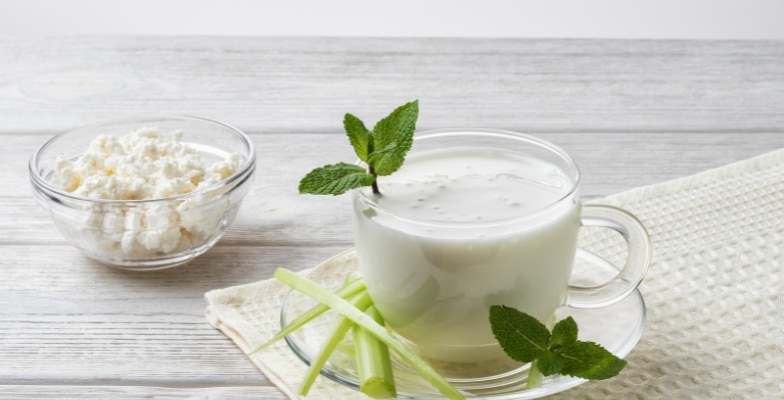4 Benefits Of Whey Protein That No One Told You About

Introduction
Whey protein is often viewed as a bodybuilder’s food, but its benefits are not limited to just building muscle size and strength. It is also used extensively as a therapeutic agent.
Whey protein is touted as a functional food that has antioxidant, antihypertensive, anti-tumor, hypolipidemic, antiviral, antibacterial, and chelating properties. 1https://www.ncbi.nlm.nih.gov/pubmed/15253675
Before I describe its awesome benefits, let’s first understand exactly what whey protein is.
What Is Whey?
Milk is 80 percent casein and 20 percent whey. Whey is the liquid that separates during cheese production.
The components of whey, called sub-factors, include beta-lactoglobulin, alpha-lactalbumin, bovine serum albumin, lactoferrin, immunoglobulins, lactoperoxidase enzymes, minerals, glycomacropeptides, and lactose. Whey has immune-enhancing and health-promoting properties. 2http://www.altmedrev.com/archive/publications/9/2/136.pdf
4 Exceptional Whey Protein Benefits
1) Whey Promotes Muscle Strength And Hypertrophy
Whey protein has all essential amino acids and is in higher concentrations than vegetable protein sources. In addition, Whey has high concentrations of branch-chain amino acids (BCAAs): leucine, isoleucine, and valine. BCAAs, particularly leucine, are important factors in tissue growth and repair.
Leucine has been identified as a key amino acid in protein metabolism during the translation-initiation pathway of protein synthesis. It may play a pivotal role in the protein-sparing effect of amino acids. 3https://www.ncbi.nlm.nih.gov/pubmed/10418071>
Whey proteins are also rich in the sulfur-containing amino acids cysteine and methionine. With a high concentration of these amino acids, immune function is enhanced through intracellular conversion to glutathione.
2) Whey Protein Contains Immunoglobulins (IgA)
When a child is born, colostrum is released from the human breast for the first few days. Colostrum is a thick, semi-liquid that contains greater concentrations of immunoglobulins than the later breast milk.
IgA is secreted in breast milk and transferred to the newborn’s digestive tract, providing better immunity than bottle feeding. Whey protein also contains a significant amount of immunoglobulins (10-15% of total whey proteins).
Other components in whey that have significant immune-enhancing and health-promoting properties are lactoferrin, beta-lactoglobulin, alpha-lactalbumin, and lactoperoxidase.
3) Whey Protein Is Linked With Weight Loss
When I make a protein shake from whey concentrate, it’s even tastier than a milkshake. It completely satisfies my cravings for sweets, which in turn helps me avoid eating refined sweet stuff. This is hugely beneficial for me, as I feel I have a major sweet tooth.
This way, drinking protein shakes can surely help anyone trying to lose weight. Furthermore, whey protein helps to build more muscle, which in turn means a higher resting metabolism. A gain of 10 lbs of lean muscle is estimated to burn around 70-100 extra calories per day, and all the calories burned will be from fat.
4) Whey Protein Has The Following Clinical Benefits
Cancer
Whey protein concentrates have been extensively researched for their role in the prevention and treatment of cancer, and glutathione stimulation is thought to be the primary immune-modulating mechanism. 4https://www.researchgate.net/publication/12126427_Whey_protein_concentrate_WPC_and_glutathione_modulation_in_cancer_treatment, 5https://www.ncbi.nlm.nih.gov/pmc/articles/PMC4744604/
HIV
Glutathione deficiency is a common problem for individuals infected with HIV. In an effort to increase cysteine and, ultimately, glutathione, several studies have been conducted on the use of whey proteins in HIV-positive individuals. 6https://pubmed.ncbi.nlm.nih.gov/11168457/
Cardiovascular Disease
Several studies have found milk intake and milk products lower blood pressure and reduce the risk of hypertension. 7https://www.ahajournals.org/doi/pdf/10.1161/hypertensionaha.107.107821
Blood Pressure
One study demonstrated that supplementation with whey protein improves blood pressure and vascular function in overweight and obese individuals. 8https://pubmed.ncbi.nlm.nih.gov/19893505/ However, please note that not all whey proteins are created equal.
For information on selecting the right brand of whey protein.
Related Article: Whey Protein Concentrate Vs. Isolate: Which Is better?
What do you think about the benefits of whey protein? Have any questions?
Let me know in the comments below!

Skill-Based Education.
Global Recognition.
Powerful Community Building
Secure a certificate of completion in as little as a day by graduating from one of our free courses.
Get Access to Our Free Courses. No Credit Card Required.

Fabulous Body Membership
Your All-Access Pass to A Fabulous Body & A Rewarding Career
25+ Certificate Courses & Programs, All Included
15 Day Free Trial, 100% Money-Back Guarantee
About Akash Sehrawat
Akash is a creator of 25+ programs and certificate courses in which more than 200,000 students have enrolled both on Udemy and Fabulous Body's native platform. Akash is also an author of three books that can be found on Amazon. His answers on Quora have gathered more than 12 million views in less than a year.











How much protein is necessary ? I have heard multiple versions – 1 g/ kg of body weight, 1 g / lb of lean body mass
Hi Arup,
there are numerous studies which points towards the range of 1.4g-2.0/kg of bodyweight. You can check the following link out for more details: https://fabulousbody.com/protein-101-calculating-how-much-protein-you-need-2/
Thank you so much Akash, Its always amazing to learn from the nuggets you keep sending us.
I understand the benefits described are mainly because of the products ingredients. But considering the benefits, how good is it to switch to plant based protein?
Best Regards
Harsha
Hi Harsha,
That is a wonderful question! What indeed?
The answer to your question lies in your initial assessment of this article’s content.
As you rightly said, it is about the ingredients that go into it.
Proteins are made up of 20 different amino acids and while Vegan or plant based proteins are not always complete sources but they always combine a few types to provide us with complete protein in every serving.
The ingredients used in vegan protein will have their own properties and contribute towards good/ill health, proteins themselves will always be there.
Similar to any non-vegan protein, it is recommended that you purchase a good quality vegan protein supplement with organic ingredients and as less synthetic items as possible.
Good luck!
Regards,
Kunal,
Team Fabulous Body